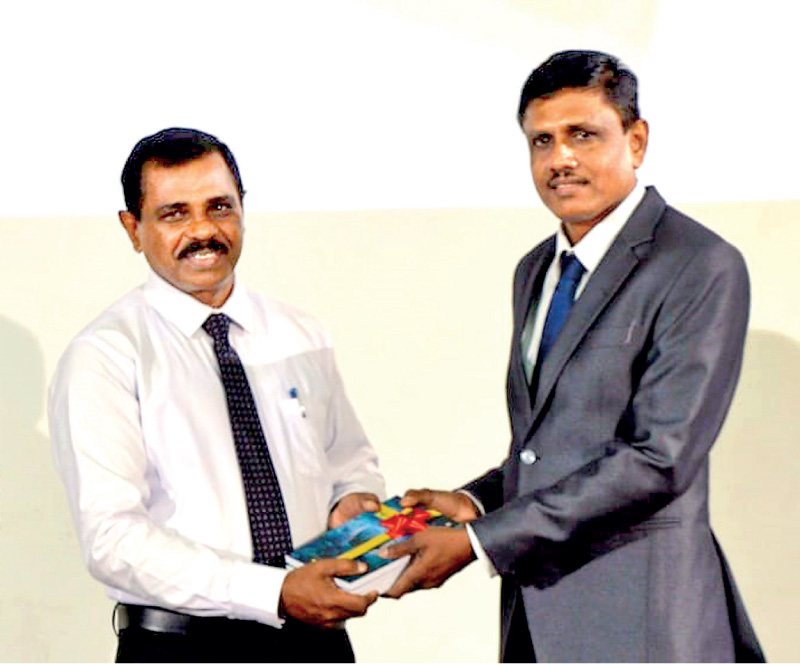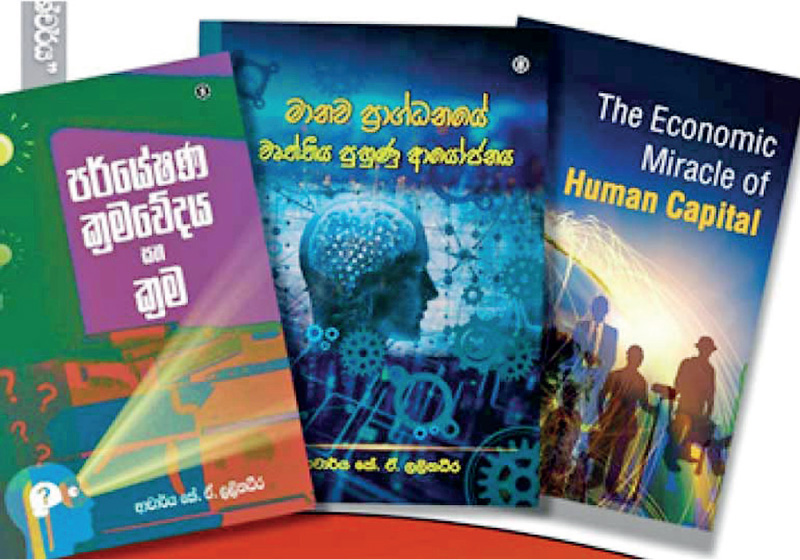Thursday Feb 26, 2026
Thursday Feb 26, 2026
Monday, 10 February 2025 01:33 - - {{hitsCtrl.values.hits}}

Author Dr. K. A. Lalithadeera (right) presenting the three books to Deputy Minister Nalin Hewage at the launch held at the Media Ministry last Friday

Three books that were released
|
 Importance of human capital
Importance of human capital
Dr. K.A. Lalithadheera, economist, writer, columnist, and educationist, made history last week by launching three books, one in English and the other two in Sinhala, authored by him. The book in English, titled ‘The economic miracle of human capital’, contains 10 articles which he had already published in newspapers. Of the two books in Sinhala, one is on the research methodology which is a must for those who plan to conduct scientific research. The other is about the investment in vocational training for developing human capital, an area which is close to the heart and mind of Lalithadheera as the administrative head of the Tertiary and Vocational Education Commission, abbreviated as TVEC.
All these three books relate to one area of economics, the development of human capital for sustained economic advancement of a country. This article, drawing on Lalithadheera, will concentrate on the present state of the human capital development in Sri Lanka and the way forward strategy to deliver prosperity to its people within a single generation through accelerated economic progress.
Incremental Capital Output Ratio
To produce any good or service, there are three essential inputs which must be used. One is the advanced physical capital. The second is human talents which are interchangeably called human, talent or smart capital. The third one is the technology that helps both physical capital and human capital to produce the needed output more effectively and more efficiently. If the technological base is advanced, an economy can convert the inputs into final products efficiently as demonstrated by the growth model variable called the Incremental Capital Output Ratio or ICOR.
This is one of the important determinants of economic growth in the Harrod-Domar Growth Model proposed in 1930s and 1940s. It measures the amount of capital units needed to produce one unit of output. If more capital is needed to do so, the economy is characterised by a low efficiency level. In the opposite, if one unit of output can be produced by using a lesser quantity of capital, that economy operates at a high level of efficiency.
Sri Lanka’s ICOR numbers are misleading during COVID-19 pandemic years and the period covered by the deep economic crisis. However, in a normal year, it has ranged between 5 and 6 indicating low efficiency in production. This contrasts with ICOR numbers recorded by the Philippines at 3.7, Thailand 4.5, Malaysia 4.6, and India 4.9 according to ADB data. What this means is that Sri Lanka has space to increase its efficiency by reducing ICOR. A critical contributor to reducing ICOR is the development of its human capital on modern lines. Lalithadheera’s book presents how Sri Lanka should set about doing so, a crucial requirement for the country today.
|
Dr. K.A. Lalithadheera
|
From traditional human capital to smart human capital
Lalithadheera advocates that the traditional human capital should be transformed into a forward-looking model of talent capital today. Previously, economic growth models included undifferentiated stock of men and women between the working ages of 15 and 65, called the labour force, as an input for production. If a country has more of these people, it is considered as a dividend because they can be mobilised for production of goods and services by mixing with capital equipment.
This vision of labour was changed into human capital covering the skills, health, and knowledge possessed by people. This was the traditional view of human capital proposed by economists like Adam Smith who said that improvement of the abilities of workers is a critical element in the progress of the economy and the welfare of people. But for centuries, this was considered as adequate for a country to ensure continued economic growth.
But how does Lalithadheera’s talent capital differ from this view? The traditional view considers the world as an unchanging static place and the human capital is also considered as an unchanging stock. But the world is subject to continuous change and is a dynamic place. The traditional static stock of human capital cannot succeed in the present world. What is needed today is the availability of human beings who have a wide local and global outlook and can predict the future events affecting their individual operations as well as community operations. If they have this quality, they can adjust their learning and development initiatives to meet the challenges posed by that dynamic world.
In essence, as Lalithadheera has presented, human capital should be dynamic, and talented. I will call his talent capital ‘the smart human capital’. What Sri Lanka needs today is an abundant supply of these smart people in its labour force. Lalithadheera says that Sri Lanka can unlock the full potential of its manpower resources to ensure sustainable growth through investment in education, training, and innovation.
|
Invention, innovation, diffusion, and imitation
Innovation is often taken as synonymous with invention. But there is a subtle difference between the two concepts as presented to us by Austrian American economist Joseph Schumpeter as far back as 1942 in his pathbreaking treatise titled Capitalism, Socialism and Democracy. He says that inventions are new creations made by scientists, engineers, or managers.
But they remain prototype developments unless they are commercially produced by businessmen through a process called innovation. If these businessmen do not step in, all these inventions will simply be relegated to the museums of inventions.
The first Apple Mackintosh Desktop computer was invented by an engineer named Stephen Wozniak. But if not for the entrepreneur Steve Jobs, his invention would have just remained a prototype development. Similarly, the scratch-free Gorilla Glass was invented by a company called Corning Incorporation in 1960s for the US Airforce. For some reason, this was not used by US Airforce and therefore remained a prototype development until 2004 when Steve Jobs used it for the screen of his first iPhone.
This is the smartness which one expects from human capital. But for a country to attain sustained economic advancement, Schumpeter says that there should be two other processes that should follow inventions and innovations. One is the dissemination of information about new inventions and innovations among people – called diffusion – and the other is the imitation of these innovations by other businessmen. This can be seen in both the Apple Mackintosh Desktop computer and the gorilla glass used for the initial iPhone.
Many others followed Steve Jobs and further improved the microlevel computing facilities by producing improved desktops and going for laptops as well as tablets and smart phones. Similarly, all the smart phone manufacturers use the gorilla glass for screen of their phones. Therefore, copying the inventions made by an inventor by others is a normal trend that we can see in the global production systems. Human capital should be smart enough to do this.
Need for robust investment in human potential
This wisdom has been presented to us by Lalithadheera as follows: “The concept of human capital is undergoing a profound transformation, evolving into what can be termed as “smart capital” to effectively address the uncertainty and complexity of modern challenges in Sri Lanka. This shift is imperative as the nation aspires to transition towards a society that embodies decency, integrity, and intelligence. A corruption-free, innovative and visionary Sri Lanka can only emerge by reshaping the social, economic, cultural, and environmental fabric of the nation. This transformative journey demands a robust investment in human potential, empowering individuals with the skills, knowledge, and ethical foundation necessary for sustainable growth.”
Need for acquiring multiple skills
What does this mean? A smart human capital unit cannot be competent in only one field. As Lalithadheera has said, it is necessary for them to develop multiple skills to facilitate the seamless movement from one industry to another to fill the talent gaps and be a useful contributor to a country’s total output, known in economic parlance as the gross domestic product or GDP. In today’s world, smart human capital should necessarily possess competencies in advanced technologies such as artificial intelligence or AI, Internet of Things or IoT, Blockchain technology, and cloud-based data storage and use which are the guiding forces of the global economic advancement.
Any person who lacks these talents will suffer within his work environment. Any country which has not invested in them sufficiently to build a critical mass – enough persons to influence the economy – of smart workers will be a laggard in the global arena. Previously, countries were divided as leaders or laggards based on their resource endowments, access to finance, access to markets and access to technology. Today, this divide is called the digital divide. Countries with high AI endowments are leading the other nations. In this context, Sri Lanka is a laggard and need to invest more in these advanced technologies. This is a forward-looking strategy and a must in the Government’s policy formulation exercises.
Issues with AI
The development of AI is regarded as the key to the future. The previous Government had planned to invest Rs. 1 billion in the development of AI competencies in the country. Though the present Government has not specifically mentioned AI, its plan to improve productivity and digital transformation involve the use of high technologies like AI. In my view, there are three basic issues involved in the use of AI in production processes.
One is its inability to improve productivity across the economy which is the necessary requirement for sustained economic growth. AI will help the large businesses to improve their productivity and benefit out of its use. However, it will not trickle down to small and medium enterprises, known as SMEs, which are the backbone of the country’s economy based on their contribution to output and employment. Hence, the productivity improvement will be skewed.
The second issue relates to its inability to generate a fair and just distribution of income. In the case of AI, capital owners and large businesses will amass incomes at the expense of labour owners. This will lead to social tensions and disharmonies derailing economic growth from the potential path.
The third issue relates to the possibility of monopoly building by those who have gained competency in AI. This group will become natural monopolies because others are not able to compete with them successfully.
Sri Lanka too should be mindful of these issues when it plans to embrace high technologies like AI. There is no meaning in assuring economic advancement if the society created by it is not fair and just. The chaos that will naturally arise in such a society will reduce the welfare of all citizens. The responsibility for solving these issues should not be passed on to the Government alone.
Lalithadheera has quoted the sociologist Margaret Mead in this connection. She has warned that citizens should never ever depend on governments or institutions to solve any major problem. According to her, all social changes come from the passion of individuals.
|
Inborn versus acquired passion
It is these passions which will ultimately determine the quality, diversity, and flexibility of the smart human capital. Without the passion burning within, no one can do what he does in society. The creator of the Apple empire which changed the lives of billions of people worldwide, Steve Jobs, told the passing out students at Stanford University in 2005, “stay hungry, stay foolish’ meaning that the passion for wisdom should burn within them if they are to succeed in their life.
But is this passion inborn or acquired? Harvard psycholinguist Steven Pinker says that it is mostly inborn and if your genetic system is not built for you to acquire it, no amount of training can provide you with wisdom. However, in his book, Lalithadheera differs. He says that miracles can be done to human beings by education, training, career guidance, and counselling. The most important requirement here is the vocational training in jobs which you acquire while learning, which comes out of Lalithadheera’s lifelong career as a human capital expert.
Importance of learning by doing
It reminds me of an old Chinese saying that ‘if you hear something, you will forget it, if you see something, you will remember it, if you do something, you will learn it’. Lalithadheera says that Singapore’s tertiary and vocational education and training system is a success because of its orientation toward, among others, work-based career-oriented curricula, learning from others but adapting to local needs, and getting industry to support training.
His recommendation: “The TVET system should function within the education system, or it must closely relate with the general education and the industries. One fundamental principle is the need to ensure that the TVET system is closely linked to the national economic development agenda. Furthermore, a vocational training delivery system needs to revamp the main structure, reducing the overlap, and should come under the one apex body. Inefficient training centers need to be wound down and merged with the major training institutes. It is recommended to strengthen the training centers with at least 10 or more training courses, as a modern training center links with schools”.
Lalithadheera deserves our commendation for this attempt.
(The writer, a former Deputy Governor of the Central Bank of Sri Lanka, can be reached at [email protected].)